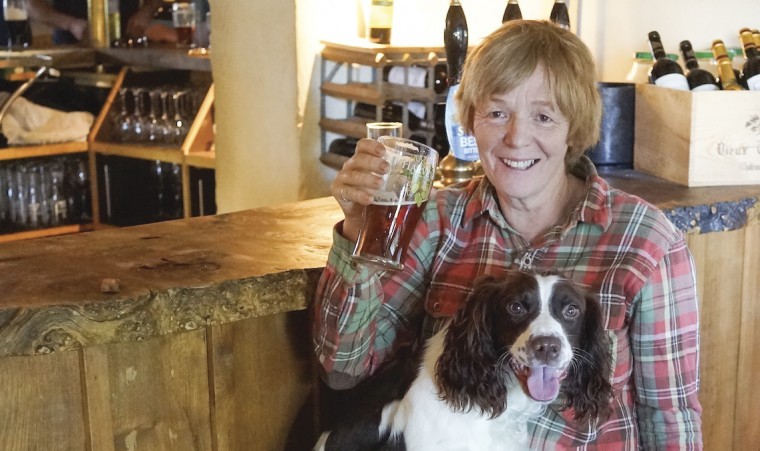Bottles cascaded down, quick as lightning; one by one they leapt off the shelf crashing onto the sparkling floor. I only wanted four, which were cradled in my arms, impeding my reaction to stop the stampede of bottles.
We had been on our way back from dropping sheep into market when I spotted the new shop, which looked empty and had plenty of space to park a trailer. My mission was to buy 500ml bottles, suitable for feeding lambs. On my entry the shop keepers had extended a warm welcome; they now rushed to my assistance. I apologised profusely, and they consoled me by saying the shelving springs needed adjusting. Lucky the bottles weren’t made of glass.
I’m not a keen shopper, I find it best to leave this to the youngsters who’ve been using click and collect recently. I jumped back into the truck feeling highly embarrassed; this was my first outing since lockdown. Perhaps it’s a good thing they don’t let me off farm very often. Once home, I wiped over the bottles and distributed them to the ‘working from home’ office folk, with a suggestion to drink it before the midday lamb feed was due. Spring water at 99p was the best deal, crazy that people willingly pay more for this than milk.
Taking animals into market to be sold under the present rules made me feel sad. My head knows the reasoning behind the restrictions, but it doesn’t seem right not be involved in the process of unloading, sorting and weighing, and to be unable to attend the auction. I miss the chit-chat and the banter; market plays an important social role within the rural community. Nobody wants to risk getting Covid-19, but driving away from market, without interaction and with no vendor input, seems strange.
Lambing has been a marvellous distraction from the world around us. The weather has been ideal. I’m glad that we didn’t scan this year, because I would have panicked about the number of triplets. No ewes have been turned out as triplets, which has meant a lot of fostering. Inevitably these are not always successful, resulting in growing numbers of hand-reared lambs.
While no vet students are available, we’ve benefited from having many family members in residence. I’ve not had to worry about cooking or house keeping. It’s been great to have the grandchildren around, too. Five month-old Angus beams smiles from his vantage point in the buggy, while he watches us working with sheep. His mother has been struggling to persuade him to feed from a bottle so I suggested Angus learn from my bottle lambs.
One of my failed foster lambs was also proving difficult to convert to drinking from a bottle. I had rescued him from the field where I found him trying to nick, he looked hunched up and was clearly hungry. He steadfastly refused to suck milk from a bottle until I tried the deception method. I suspended a bottle under a ewe, and covered her teat; only then did he suck the bottle milk with great gusto because he perceived the milk to be coming from the ewe. I named him ‘Tricky’ and now he’s one of the first up to the bottle rack.
In the field we noticed another mother with her foster lamb sticking close by but missing her own lamb. We searched everywhere with no joy and came to the conclusion that it must have been taken by a predator. Just as we were leaving, we saw a lamb being bunted away by another ewe, and it was the very lamb we were looking for. Catching it, though, proved difficult; it slipped through the crook and evaded Nigel’s rugby tackle.
Suddenly we were joined by Brie, who had been observing our antics from Shrek (ATV), which is where she knows to stay until commanded otherwise. I hadn’t thought to ask for her help but she sailed in and caught the correct lamb and held it until we got there. Needless to say, Brie was our hero, and she knew it! Extra cuddles and rations that day. The ewe was delighted to be reunited with her lamb and has been more vigilant since.
Like humans, ewes adopt many different approaches to parenting. Some ewes are over anxious and incredibly protective, while others have a ‘live and let live’ approach. In the early days the latter can be an expensive mistake when predators are looking for a tasty meal. We’ve had problems with one particularly brazen fox, who was seen pestering the lambs and then switched to chicken on the menu.
Yesterday at 2pm, a desk worker during a conference call spotted the little tyke advancing on my chickens and raised the alarm. I was closeted in the annexe, along with my moral support and inspiration brigade (the dogs), writing this column.
Pandemonium ensued, shouting and barking as we chased off the intruder. Sadly we were too late to save them all. We scouted around the farm collecting up chickens who were enjoying their usual freedom and placed them within the safety of the chicken house. They won’t be impressed to be deep litter hens for now, but we need to preserve our egg producers; after all cake is important. Must keep the boss happy, we need him to shoot the fox.
Such a pity we can’t shoot the virus. Covid-19 is disrupting everyone’s lives and crashing the world’s economy. These are extraordinarily challenging times. In the face of adversity I applaud the revival of community spirit, and kindness. We should emphasise the positives in life. Increased focus on buying locally produced food is good.
I get annoyed by the TV presenters’ attitude, especially when they interrogate those who are bearing the responsibility of steering our country through this uncharted territory. No one has all the answers. The slogan STAY ALERT has been criticised, although it’s appropriate on our farm regarding foxes.




